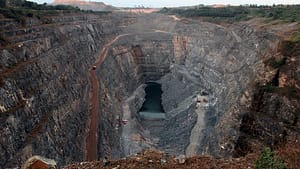
On April 16, 2025, Ghana’s government made a historic move, assuming operational control of the Damang gold mine after rejecting South African company Gold Fields’ application to renew its 30-year lease, set to expire on April 18, 2025, according to the Ministry of Lands and Natural Resources . This decision, announced by the ministry, marks a break from the “neo-colonial” tradition of automatic lease renewals, signaling Ghana’s intent to ensure its gold reserves directly benefit its citizens. The Damang mine, located in Ghana’s Western Region, produced 135,000 ounces of gold in 2024—6% of Gold Fields’ global output—but had ceased active mining in 2023, processing only stockpiles as part of its end-of-life plan .
The government’s rationale was clear: Gold Fields failed to declare verifiable mineral reserves and omitted a required technical program for past and future mining activities in its renewal application . The Minerals Commission of Ghana emphasized that this decision aligns with the Minerals and Mining Act, 2006 (Act 703), citing the company’s lack of investment in exploration over the past two years as evidence of unsustainable practices. “The Damang mine’s return to state oversight marks a critical step in Ghana’s economic reset,” the ministry stated, promising to protect over 1,300 jobs and prioritize local hiring and community-based enterprises during the transition . This move follows Ghana’s broader policy shift, including an order for foreigners to exit its gold market by April 30, 2025, to curb smuggling and boost national revenue .
This isn’t just about one mine—it’s about Africa reclaiming its wealth. Ghana, Africa’s largest gold producer, is challenging a system where foreign companies extract resources with minimal local benefit. The Damang takeover echoes historical struggles against colonial exploitation, when Africa’s gold, diamonds, and oil fueled European empires. Today, with 840 million youth across the continent, Ghana’s bold action inspires a generation to demand economic sovereignty, ensuring resources like gold drive schools, hospitals, and factories, not just foreign profits.
PowerAfrika’s Take: Resources for the People
At PowerAfrika, we see Ghana’s move as a subtle yet powerful call for African nations to take charge of their destiny. The Damang mine’s return to state control isn’t just about gold—it’s about dignity, opportunity, and rebuilding Africa’s economic backbone. This aligns with our mission to spark conversations on the continent’s reconstruction, much like our petition to rename Kotoka International Airport, which seeks to honor Ghana’s heritage and inspire pride. Join this movement at https://powerafrika.com/rename-kotoka-airport/ and let’s reshape Africa together.
Amplify the Conversation with PowerAfrika’s Tools
Ghana’s stand deserves to be shared far and wide. Create a compelling video of this economic reset using Renderlion, an AI video generator that crafts visuals to inspire without slowing your site (https://renderlion.com/?via=asafo). Spread the word on social media with AiReelGenerator, making fast-loading reels to rally African youth around resource sovereignty (https://aireelgenerator.com?refid=). Want to lead this change? The MBL program offers resources to develop leadership skills, empowering you to advocate for Africa’s wealth like Ghana’s leaders (https://philjohnson1.podia.com/a/2efwx). This moment connects to our post on Africa’s manufacturing crisis, where we called for rejecting raw material exports in favor of local production (https://powerafrika.com/manufacturing-in-africa/).
Little Known Facts About Ghana’s Gold Industry
- Gold Wealth: Ghana produces over 4 million ounces of gold annually, making it Africa’s top gold exporter, yet much of the profit historically leaves the continent .
- Damang’s Decline: Gold Fields invested zero dollars in exploration at Damang from 2023-2024, raising doubts about its commitment to Ghana’s future.
- Youth Potential: Ghana’s 10 million youth could drive a gold-based manufacturing boom if given training and opportunities, per the African Development Bank.
